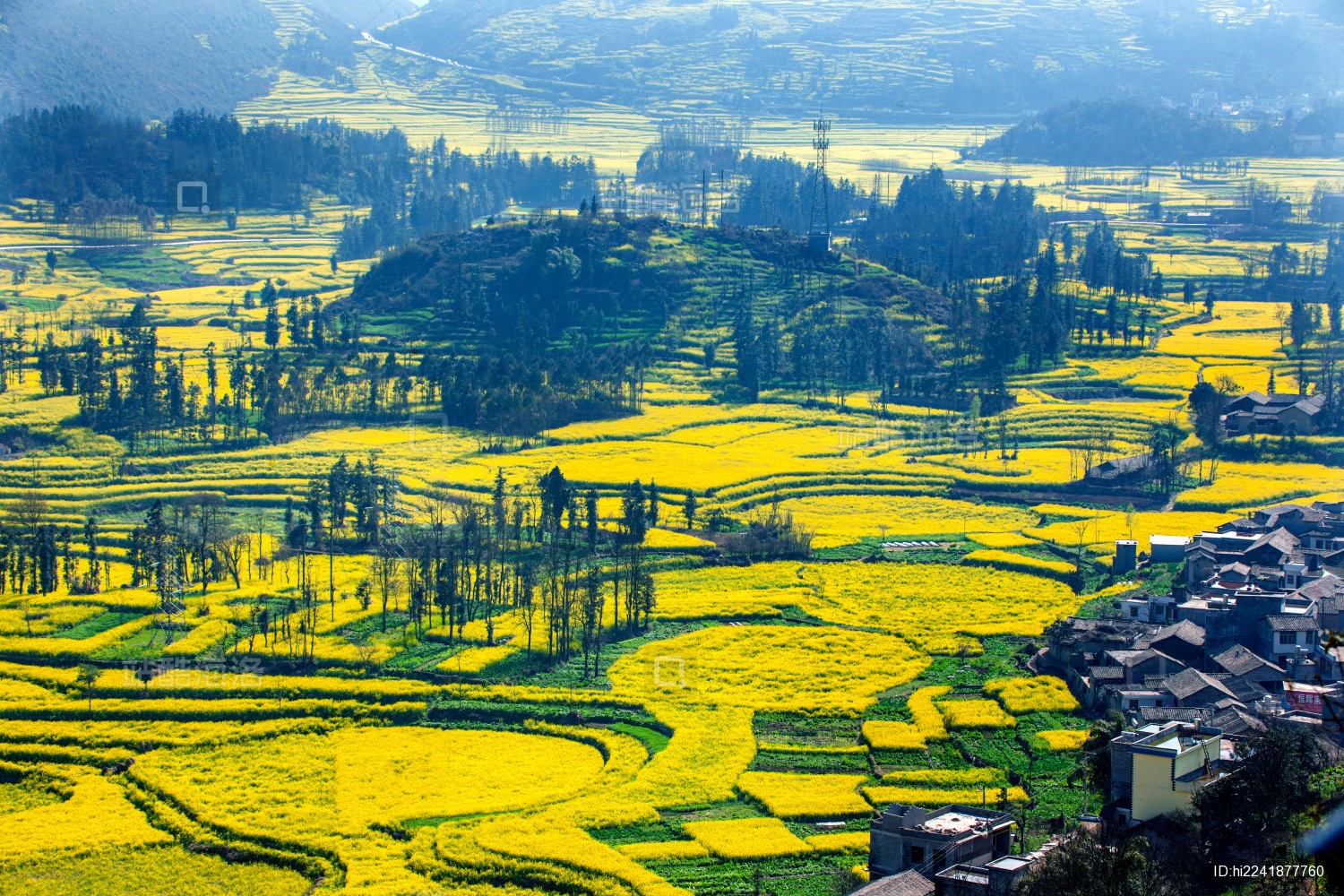Nestled in the mist-kissed valleys of southwestern China, Yunnan Province transforms into a living canvas each spring—a riot of gold that paints hills, terraces, and valleys with breathtaking abandon. As March unfolds, the 油菜花海 (yóucài huā hǎi), or rape flower fields, erupt into a spectacle that feels both ancient and alive, a testament to nature’s artistry and rural tradition.
A Sea of Gold: The Scale of Splendor
Imagine endless waves of golden blossoms stretching to the horizon, their petals shimmering under the Yunnan sun like liquid amber. The rape flowers, Brassica napus, carpet over 200,000 hectares of land here, their uniform rows climbing terraced hillsides and embracing emerald rice paddies. In places like Luoping, the “Kingdom of Rape Flowers,” the landscape undulates in golden swells, interrupted only by whimsical karst peaks rising like islands from the sea—a surreal blend of geometry and wilderness.
The scale is dizzying: from 观景台 (observation decks) atop hills, visitors gasp at the patchwork of yellows—deep, sunflower hues merging with pastel creams—contrasting sharply with the rich greens of tea plantations and the earthy browns of plowed fields. It’s a living mosaic, where every curve and contour whispers of human labor and natural harmony.
Threads of Tradition: Rural Life in Bloom
Beyond the spectacle lies the heartbeat of Yunnan’s countryside. Farmers in wide-brimmed hats tend to their fields, their weathered hands sowing a crop that has sustained communities for centuries. Ox-drawn carts creak along dirt paths, carrying bundles of rape flowers destined for oil presses, while villagers in indigo-dyed garments (traditional dress of the Yi and Miao ethnic groups) harvest greens and chat in dialects as old as the land.
In small hamlets like Jianshui, mud-brick cottages with tiled roofs peek through the blossoms, smoke curling from chimneys as families prepare meals of 菜籽油 (cài zǐ yóu)—fragrant rape seed oil—stir-fried greens and local tofu. Beehives dot the edges of fields, their occupants busily pollinating the flowers, while children chase butterflies through alleys lined with drying rape flower stalks. This is rural Yunnan unfiltered: a tapestry of ancient rhythms, where the land dictates the calendar, and every bloom tells a story of resilience.
Sensory Delirium: The Magic of the Fields
To walk among the rape flowers is to surrender to a multisensory symphony. The air hums with the buzz of bees and the rustle of petals; the scent is sweet, earthy, and faintly peppery—a bouquet unique to this season. Sunlight filters through the canopy, casting dappled shadows on dirt trails, while the occasional breeze sends waves rippling through the 花海 (flower sea), creating a golden shimmer that rivals the stars.
At dawn, mist clings to the fields, softening the colors into a watercolor dream. By midday, the sun ignites the blossoms, turning them into a blaze of luminosity. Sunset paints the sky in apricot and violet, the flowers glowing like embers beneath. And at night? Fireflies dance above the stalks, a celestial mirror to the constellations overhead.
Why Yunnan’s Rape Flowers Matter
Beyond their beauty, these fields are a lifeline. Rape seed oil is a dietary staple; the flowers’ roots prevent soil erosion; and the annual bloom has birthed a thriving eco-tourism industry, supporting villages with homestays, craft markets, and farm-to-table experiences. It’s a model of sustainable harmony—where nature’s bounty and human ingenuity coexist.
For travelers, the 花海 offers more than a photo op. It’s a journey into slow time, a chance to witness rural China’s soul still beating to the rhythm of seasons. Whether you’re hiking through terraces, sipping tea in a hillside inn, or simply lying back to let the golden canopy envelope you, Yunnan’s rape flowers remind us of the quiet poetry in working with the earth.
When and Where to Visit
- Peak Season: Late February to early April (best in Luoping, Lijiang, and the Yuanyang Terraces).
- Tips: Wear comfortable shoes for field walks, bring a wide-brimmed hat, and savor 油菜花炒蛋 (yóucài huā chǎo dàn)—a local dish of eggs scrambled with fresh rape flowers.
As the poet might say, Yunnan’s rape fields are not just flowers—they are a dialogue between heaven and earth, a hymn to the land, and a reminder that beauty thrives where tradition and nature embrace.
Come. Lose yourself in the gold. And let the 花海 whisper its ancient song. 🌼
